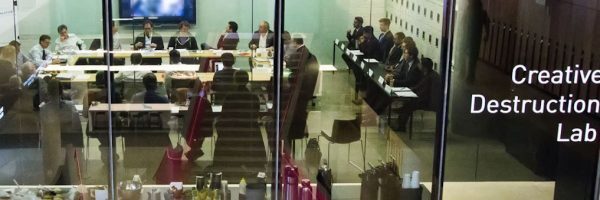A Columbia Business School Professor’s Quest to Find Efficiency in Affordable Housing

Working in the heart of New York City, just blocks away from some of the most valuable real estate in world, is a constant reminder of the problems with affordable housing. Stijn Van Nieuwerburgh, the Earle W. Kazis and Benjamin Schore Professor of Real Estate at Columbia Business School, address the issue first hand in a recent study, asking whether affordable housing can become more efficiency in an increasingly urbanized world.
“Can we improve the efficiency of the affordable housing system?” Van Nieuwerburgh asks in his latest study, “Affordable Housing and City Welfare.” Van Nieuwerburgh co-authored the study alongside Jack Favilukis of the Sauder School of Business at the University of British Columbia and Pierre Mabille of the Stern School of Business at New York University, which pivots the conversation away from a strictly cost conversation to one of social insurance.

“A lot of the previous models that have thought about these questions, haven’t really modeled risk, risk aversion, and insurance against risk,” Van Nieuwerburgh says. “That is what’s new here; it’s a finance perspective on the world.”
“Van Nieuwerburgh notes that people first sought out rent controlled or rent stabilized units when it was appropriate for their economic situation; but then over time, their careers progressed and they began to earned more. The research demonstrates that these very same renters tend to stay in the same unit when they can afford a market-rate unit, effectively taking the place of someone who earns less.”
A proposition from Van Nieuwerburgh in the study is that of a mean’s test, requiring applicants for an affordable housing lottery to earn within 30 percent of the proposed median income. Which, if successful, would allow needier applicants to earn higher priority, rather than keep tenants in housing built for people in lower income levels.
“That means that really needy people are going to get these units,” according to Van Nieuwereburgh.
“We can add everybody up, and we can see whether society is better off or not under this new policy,” he says. “The reason we’re better much off with this more efficient housing system is because poor people now get access to affordable housing units that they didn’t before.”
A primary difficulty with current proposals and changing rent laws, Van Nieuwereburgh argues, is that developers will have less economic incentive to build affordable housing if the demand increases while the cost of land in cities like New York continues to climb. His model also entails avoiding tax increases on wealthier residents, arguing that it disincentivizes upper-class earners and may not be more beneficial than voucher programs. However, despite the fiscally conservative framework, the study also advocates for potential solutions like “upzoning,” which can create more density in areas with tighter development laws.
You can read more about the affordable housing study, which was inspired by Mathew Desmond’s book Evicted, here.
Inside the University of Toronto’s Creative Destruction Lab

The Creative Destruction Lab (CDL) at the University of Toronto Rotman School of Business is a seed-stage program created exclusively for scalable science-based companies. Launched in 2012, this program employs objectives-based mentoring to help maximize equity value creation for its ventures. The lab is best suited for early-stage companies, particularly those with links to university research labs.
The Creative Destruction Lab Program
The CDL is a nine-month program that employs a coaching process to help business founders commercialize their advances in science and technology. There are four main elements of the program:
- Mentorship: The founders work alongside select entrepreneurs and angel investors in intensive full-day sessions to assess their business progress and to set short-term objectives.
- Investment Opportunities: Founders have the chance to raise capital in meetings with entrepreneurs, angel investors, and partners from leading venture capital firms.
- Technical Feedback: The founders receive advice on their technical road maps and objectives from world-renowned experts at leading academic institutions.
- Business Development Support: Finally, the founders are able to work with MBA students to develop their financial models, evaluate potential markets, and fine-tune their strategies for scaling.
“The breadth and depth of insight that we were given access to was phenomenal,” said participant Karl Martin, founder of Nymi, a wearable technology firm in the healthcare space.
CDL Locations
Unlike many seed-stage programs, CDL has centers in five locations across Canada. Each location focuses on a specific stream of ventures and offers specific resources.
- Calgary: Working with the Haskayne School of Business, the Calgary location focuses on a few key research pillars including energy innovations, human dynamics, engineering solutions for health, new earth-space technologies, and other areas.
- Halifax: The Halifax location leverages the Rowe School of Business at Dalhousie University and fosters “blue-green” technology—focused on agri-tech, bioproducts, and environmental technology—and “prime” technology, including startups tackling problems in healthcare, finance, energy, chemical, media, transportation, and agriculture.
- Montreal: In partnership with HEC Montréal, the Montreal location focuses on startups using artificial intelligence and data analysis technologies.
- Toronto: The main location in Toronto, run alongside the Rotman School of Management, focuses on three types of startups. The first is “Prime” startups tackling problems in healthcare, finance, energy, chemical, media, transportation, and agriculture. Meanwhile, Quantum Machine Learning startups are grounded in physics, math, statistics, machine learning, electrical engineering, and/or quantum computing. Finally, massively scalable Artificial Intelligence/Machine Learning startups focus exclusively on artificial intelligence and machine learning.
- Vancouver: Located in Vancouver, this location operates in partnership with the Sauder School of Business at the University of British Columbia. It focuses on startups in the “Prime” stream as well as those in BioMedTech, including chemical, biological, and medical ventures.
Partnership with NYU Stern to Expand CDL to New York
And, beginning on September 1, 2018, the Creative Destructive Lab will partner with the NYU Stern School of Business to establish its first lab outside of Canada. The newest location will bring Stern faculty and MBA students alongside angel investors, serial entrepreneurs, and founders of pre-seed stage startups in science and technology. CDL New York will begin accepting applications in January 2018 and expects to admit around 25 ventures the first year.
“Our model for developing massively scalable science-based ventures has proved successful in Canada. And we anticipate it will be similarly successful for our partners at NYU,” said Ajay Agrawal, a Rotman entrepreneurship professor and the founder and academic director of the lab, in a recent news release about the expansion.
New Program Executive Director
In other news, Rotman chose Sonia Sennik to be the inaugural executive director of the Creative Destruction Lab and its national network of programs. Sennik will be responsible for the lab’s oversight and coordination as well as its strategic operational and programmatic leadership.
As a recent graduate of Rotman’s Executive MBA program, Sennik is uniquely positioned for her new role. She was the inaugural recipient of the Rotman Social Impact Award and excelled in leadership during her time in the program. She’s also held senior project and engineering management roles at HATCH, a global engineering consultancy.
Of Sennik’s appointment, Agrawal said in a news release: “The Creative Destruction Lab is expanding rapidly, both geographically and programmatically. Sonia will provide leadership, vision, and energy to help ensure the success of the Lab and its ventures in the coming years.”
Graduates of CDL
Over the years, the Creative Destructive Lab has had many graduates, including:
- Thalmic Labs (Waterloo): Thalmic Labs develops revolutionary wearable technologies that explore the future of human-computer interaction.
- Atomwise (San Francisco): Atomwise is a Deep Learning technology designed for novel small molecule discovery to help develop better medicines faster.
- Deep Genomics (Toronto): Deep Genomics creates life-saving genetic therapies including a biologically accurate data- and AI-driven platform that supports geneticists, molecular biologists, and chemists.
- Kyndi (Palo Alto): Kyndi incorporates advanced artificial intelligence and symbolic natural language understanding to help knowledge workers process and consume vast amounts of information in order to better make critical decisions.
- Heuritech (Paris): Heuritech bridges the gap between social media and commerce with cutting-edge deep learning technology that detects emerging product buzzes online.
To learn more about the Creative Destructive Lab, including information about applying, visit the main CDL website.
This article has been edited and republished with permissions from Clear Admit.
Yale Faculty Discuss the Global Network for Advanced Management

What happens when leading business schools join forces to increase their resources for students, faculty, staff, alumni and stakeholders? This is what the Global Network for Advanced Management (GNAM) set out to discover in 2012. Continue reading…
